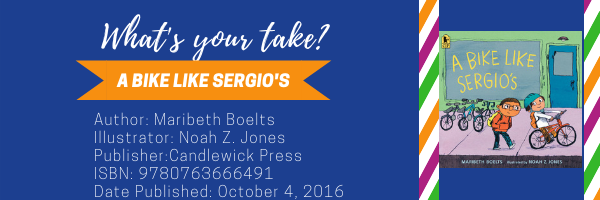By Dorea Kleker, University of Arizona and Maria Acevedo-Aquino, Texas A&M University-San Antonio.
In the third installment of February’s MTYT, Dorea Kleker and Maria Acevedo-Aquino discuss child agency as seen in the picturebook A Bike Like Sergio’s, written by Maribeth Boelts and illustrated by Noah Z. Jones.
A Bike Like Sergio’s tells the story of a lucky find and a difficult choice. Ruben is aware that his parents cannot afford to buy him a bike, but it’s all he wants–a bike like Sergio’s and the money to pay for it. When Ruben picks up a fallen $100 bill, he knows he should give it back, but it’s not easy to return your wish. Boelts makes readers feel for Ruben and his inner turmoil, while Jones’s illustrations depict the reality of financial struggle. Ultimately, Ruben is reminded of what he does have–his family.
MARIA: Ruben really wants a bike like his friend Sergio. He also wishes he could buy a pack of football cards instead of the bread his mother asked for. Then, one day, he finds a $100 bill and knows it belongs to the lady that was in front of him at the grocery store. Tensions emerge as Ruben must decide between keeping the money for himself (since nobody else noticed the bill on the floor) or return it to the lady, who, like him, is a frequent customer at the grocery store.
This is a powerful story that highlights a children agency during conflicting situations. When Ruben returns the money to the lady the illustration adds tension, because it depicts the bike shop with two important signs: “OPEN” and “BIG SALE,” which may be tempting to Ruben. Perhaps he could buy the bike at a cheaper price. But Ruben knows that the right decision is to return the money, and he doesn’t need adult mediation to think, feel and act honorably.
DOREA: From the moment Ruben picks up the money, I am drawn into his story and wonder at the turn of every page whether or not he will share his secret. Similar to I Got It! (reviewed in our last post), Ruben experiences a wide range of conflicting emotions (excitement, guilt, dread, fear, anxiety, joy) in a relatively short timespan, so the story is intriguing and unpredictable. I root for Ruben, but even my own emotions are complex; I want him to return the money and get the bike he so desperately wishes for.
Maria, your point about the lack of adult intervention really strikes me. If I am honest with myself, I assumed at some point Ruben would find his inspiration to do right partly due to the words or actions of an adult. Furthermore, I half-expected the woman in the blue coat (the money’s rightful owner) or Ruben’s parents to reward him for doing what is right–perhaps a portion of the money or a promise of that bike. As someone who considers herself an advocate for children, my own responses to this story remind me that we do children a disservice when we assume they are unable to advocate for themselves or that a reward is always necessary. Clearly, we need more stories like Ruben’s for both our young and grown-up readers.
MARIA: Dorea, the minute he returns the bill, I became curious about the ending. It makes me wonder: is the author going to reward him with the bike? Or will the story reinforce the idea that prosocial actions should be done for the common good regardless of a reward? This reminds me of a complex conversation that emerged in my class this week with undergraduate students around the use of behavioral charts in early childhood classrooms. These charts are strongly tied to rewards, so as a class we wondered how behavioral charts encourage children’s engagement, inner motivation, relationships with each other, and development of emotional literacy, among others. It is so common to observe the same child (or children) not receiving points and rewards that it is important to think about the consequences of these strategies for all children in the classroom. What would Ruben learn if he receives a physical reward?
While the adults are not present during the resolution, the last page shows a loving scene where Ruben’s family acknowledges the hard decision he makes. The family could have been “absent,” but Ruben, as a cultural being, develops values and beliefs that shapes how he navigates his complex life.
DOREA: Before Ruben’s parents can acknowledge and empathize with the hard decision he makes, they have to create an environment in which Ruben feels safe in sharing his story: “At home, everyone is waiting and the lost and found story is mine to tell.” We teach empathy as identifying with or vicariously experiencing the feelings, thoughts or attitudes of another. However, Ruben’s parents help us remember that there is more to this: we must recognize that our friends, our families and also strangers all have stories. And we must teach both children and adults to actually wonder and care about what these are.
Title: A Bike Like Sergio’s
Author: Maribeth Boelts
Illustrator: Noah Z. Jones
ISBN: 9780763666491
Publisher: Candlewick Press
Publication Date: October 4, 2016
This is the third installment of February’s issue of My Take/Your Take.The first installment can be found here. Last week’s MTYT can be found here. Check back each Wednesday to follow the conversation!

